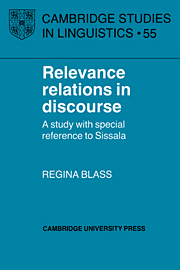Book contents
- Frontmatter
- Contents
- Acknowledgements
- List of abbreviations and symbols
- Maps
- Introduction
- 1 What is discourse?
- 2 Relevance theory and discourse
- 3 The interpretive-use marker rέ
- 4 Constraints on relevance and particle typology
- 5 Baa: truth-conditional or non-truth-conditional particle?
- 6 Defining in Sissala
- 7 Meanings and domains of universal quantification
- 8 Co-ordination and stylistic effects
- Notes
- References
- Index
1 - What is discourse?
Published online by Cambridge University Press: 02 December 2009
- Frontmatter
- Contents
- Acknowledgements
- List of abbreviations and symbols
- Maps
- Introduction
- 1 What is discourse?
- 2 Relevance theory and discourse
- 3 The interpretive-use marker rέ
- 4 Constraints on relevance and particle typology
- 5 Baa: truth-conditional or non-truth-conditional particle?
- 6 Defining in Sissala
- 7 Meanings and domains of universal quantification
- 8 Co-ordination and stylistic effects
- Notes
- References
- Index
Summary
Discourse and discourse analysis
We all know that hearers have intuitions about the grammatically of sentences. It is also true that they have intuitions about the wellformedness of discourses. However, are we talking about the same kind of well-formedness judgement? Some seem to think this is the case. I quote Werth (1984:17): ‘We will argue that connectivity at both levels – that is, both between and within sentences – is crucially semantic, and that the obvious formal links which exist are in fact the overt manifestations of semantic connections.’ Those who propose discourse and text grammars, such as Harris (1952), Longacre (1983) and proponents of discourse-production models, think along similar lines.
However, the fact that utterances of single grammatical sentences can themselves constitute acceptable or unacceptable, well-formed or illformed discourses, can be used to show that there is a fundamental difference between judgements of grammaticality and judgements about the acceptability or well-formedness of discourses.
Consider examples (1)–(4):
A dog is for life.
Trespassers will be prosecuted.
She can't.
Every chair has a nose.
All four are grammatical sentences of English: but which of them constitute complete and well-formed discourses? This question cannot be answered without taking background or contextual assumptions into account. Although it may be hard to understand in isolation, we realise that (1) is a complete and acceptable discourse when, for instance, we see it on a sticker on the back of somebody's car.
- Type
- Chapter
- Information
- Relevance Relations in DiscourseA Study with Special Reference to Sissala, pp. 7 - 42Publisher: Cambridge University PressPrint publication year: 1990



